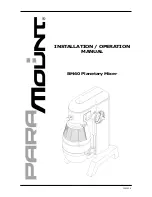
The insert point allows limiters, compressors and other signal
processing units to be added as required to particular input
channels and because it is located PRE EQ, noise generated by
the external equipment may be reduced by a small amount of
H.F. cut in the Equaliser.
3. LINE
INPUT
The LINE Input is a 3-pole
1
⁄
4
"‘‘A’ gauge jack socket, to accept
balanced or unbalanced line level sources when the LINE
switch(5) is pressed. Unlike the low impedance Microphone
input, this stage presents a high impedance(>10k
Ω
) to the in-
put signal, enabling many types of instruments to be plugged
straight in without D.I. boxes or external preamplifiers.
4.
PHASE REVERSE(Ø)
The PHASE REVERSE switch reverses the polarity of the se-
lected input, providing a convenient method of compensating
for incorrect wiring or microphone placement. In some cir-
cumstances it may be found that pressing PHASE REVERSE
will help with feedback avoidance. The switch should nor-
mally be released when not required.
5. LINE
SELECT
The LINE switch selects Line input when pressed, and Micro-
phone input when released. When Line is selected the Gain
range is reduced by 20dB(see 6 below).
6.
GAIN CONTROL
When the Microphone input is selected this control acts as a
SENSITIVITY control covering a 50dB range. Channel signal
level increases as the control is turned clockwise. When the
Line input is selected it serves as a GAIN control, with the
scaling reduced by -20dB from the printed scale. A nominal
0dB input signal will pass through at unity gain, with the
knob set at the 20dB position. Some audio equipment, par-
ticularly that intended for domestic use, operates at a nominal
-10dBV level and an increased Gain setting will be required.
7. HI-PASS
FILTER
Pressing this switch inserts a 12dB per octave 100Hz Hi-Pass
Filter in the signal path, immediately after the input amplifier.
This is particularly useful on live vocals, and its use is
strongly recommended, even on male vocals. It can also be
used for filtering out noise such as stage rumble.
Page 13
Summary of Contents for Spirit Monitor
Page 1: ...Page 1...














































